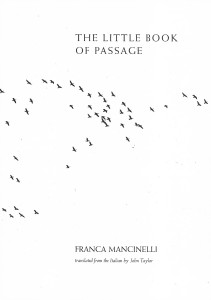John Taylor sur « Libretto di transito » de Franca Mancinelli / Times Literary Supplement
- Post By: johntaylor
- Date:
- Category: Actualités
John Taylor sur Libretto di transito (Amos Edizioni) de Franca Mancinelli, article paru dans le Times Literary Supplement (du 21 juin 2019). Cet article est extrait de l’introduction de John Taylor à sa traduction en anglais du même livre, sous le titre The Little Book of Passage (Bitter Oleander Press):
Franca Mancinelli’s Libretto di transito appears after her first two books of poetry, Mala kruna (2007) and Pasta Madre (2013), won several prizes and established her as a compelling new voice in contemporary Italian writing. In Mala kruna, she explores an individual’s relationship to the Other and to otherness (the title means “little crown” in Serbo-Croatian), often in the context of love and the quest for selfhood; and then, in Pasta madre (literally “Mother Dough”), she focuses on the “original dough” with its “living yeast” of nature and poetic language, that is, the primordial elements to which she must time and again appeal to seek out wholesome resources. Vivid, unusual, often intense imagery emphasizes her remove from this vital nourishment as well as its curative potential. The poems provide privileged moments, often taking place between sleeping and waking, when brief communions with this primal, hope-fostering “dough” become possible, or, on the contrary, when she senses her separation from it even more acutely. (These two earlier books have been recently reprinted as A un’ora di sonno da qui (At an Hour’s Sleep from Here) by Edizioni Italic & Pequod.
The title of her new book is also is semantically resonant. This “little book” (much more than an operatic “libretto”) is about being “in transit” (and in transition), about “passing” from one state or situation to another, and the title also echoes such phrases as “libretto d’istruzioni” (“instruction booklet”) or “uccelli di transito” (“birds of passage”), and even remotely recalls “passing away”, “death”. Travel is often depicted, especially train trips, with suitcases to pack or unpack, and “things you have forgotten to take with you”. Some of the prose poems hint at potentially life-changing (inner or outer) “movements” that are taking place, have taken place, or might take place in the near future. The subject matter and the very writing of this book trace out an overarching journey or “passage”.
What does the shift from concise verse poetry to equally concise poetic prose imply? A slight increase in storytelling, though in the most fragmentary sense, while Mancinelli maintains the same enticing mixture of realistic and oneiric imagery. She might well designate a setting (a railway carriage), suggest that she is traveling alone (“without knowing what brings me to you”), mention a gaze which she directs out the window and which, by means of a reflection on the pane, offers an imaginary glimpse, even a prolonged view of that missing “you” who now seems superposed on the pane as well as on the landscape rushing by, but the haunting quality of her texts lies less in succinct plots than in what is suggested by them: in this case, the unstated emotion that makes the other’s absence so present and enables the narrator to “read”, as the same piece concludes, “into your face until light came”. Other events perhaps subsequently take place—or not. “The story continues in silence,” as the poet phrases it elsewhere.
One of Mancinelli’s two epigraphs is by Emily Dickinson: “To fill a Gap / Insert the Thing that caused it.” “Gaps” inspire several prose poems: the distance between two places or two human beings; a breach in a continuity that must be sealed, perhaps by the “clay” that a human being applies to the “broken, empty places” of another human being; an abyss, modest or more dramatic, that suddenly gapes open, like the “widening crack” that the poet associates with a train rushing by and that also announces “something enormous for which we still have to wait” (“Con il tremore di qualcosa di enorme, per cui dobbiamo ancora aspettare”). Mancinelli confronts other disunities as well: mankind and nature, the inner world of sensibility and the outer world of brute facts. The interplay between “I” and “you” is particularly intriguing, as the poet sometimes employs “you” to designate herself. Above all, she movingly uses autobiographical details to raise more general psychological and philosophical issues.
The second epigraph is from the philosopher Simone Weil: “L’arbre est en vérité enraciné dans le ciel.” As in Weil’s maxim, the real world in its multifarious forms possesses, for Mancinelli, a less immediately accessible or perceptible origin than the mere ground on which we walk. Similarly, maybe the roots of a life take their nourishment (or poison) from secret fault lines; maybe they also culminate in some kind of “sky” or “heaven” (the French word ciel means both). At all events, the genuine sources of what we feel, think, dream, and do remain at a remove, and it is the task of poetry to try to bridge that distance or at least to show where the bridges might be built. Libretto di transito notably concludes with a beneficial metaphorical tree whose leaves are “thinking up a sentence for you”. In fact, all the pieces in this book, taken one after another, seemingly sketch out a single movement, through writing, towards a kind of healing or renewal.
© John Taylor
Times Literary Supplement, 21 June 2019, p. 32

Laisser un commentaire